On International Women’s Day, Kay Stephens reflects on how the far Right and the mainstream co-opt a feminist stance for racist and anti-feminist ends, particularly around issues of sexual violence.
In 2018, we witnessed an escalation in far-right demonstrations in the UK as a response to the arrest and then jailing of ex-EDL leader Tommy Robinson for filming outside Leeds Crown Court during an ongoing child sexual abuse trial. Robinson’s arrest sparked six far-right mobilisations in the months that followed, with four specifically calling to ‘Free Tommy Robinson’, attracting up to 15,000 people on the street. These far-right marches have been continually framed around sexual violence, feeding off moral panics about so-called ‘Asian groomers’.
When the far Right complains of ‘political correctness’ preventing sexual violence from being named and addressed as a distinctive issue of Muslim culture, it seems obvious enough that they are weaponising ‘free speech’ and co-opting the language of feminism to further their anti-Muslim agenda. But mainstream media and politicians, across the spectrum, too, perpetuate racialised narratives of sexual threat, which obscure the systemic nature of sexual violence, whilst at the same fuelling anti-Muslim racism. This in turn legitimises state authoritarianism, whilst absolving the state of its responsibility to provide adequate support services for vulnerable people and survivors of sexual violence.
In order to resist this toxic narrative around ‘Asian grooming gangs’, we need to unpack the dangers of viewing sexual violence through a primarily racialised lens and also examine how these ideas have taken root.
The media
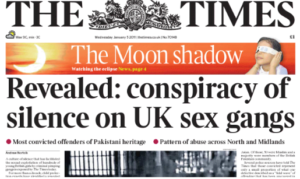 The trope of the Asian groomer as a racial crime threat builds on a 2011 Times article by journalist Andrew Norfolk, which claimed to identify a distinctive form of child abuse – ‘on-street grooming’ – perpetrated predominantly by Pakistani Muslims targeting white girls.[1] This set the terms for the ensuing wall-to-wall media coverage, which attempted to locate the problem in the repressive and patriarchal ‘cultural mindset’ of perpetrators, while citing political correctness as a stumbling block in identifying this as the issue and hence dealing with it in the normal way. There was little, if any, media speculation about the cultural reasons for sexual offences against children committed by white men – while Muslim perpetrators were depicted as the norm in their ‘deviant’ culture, white perpetrators were apparently mere aberrations. In fact, as extensive coverage catapulted Child Sexual Exploitation (CSE) cases involving Asian perpetrators – such as in Rotherham and Rochdale – into national consciousness, those involving groups of white perpetrators such as in Penzance, Torbay, Derby and Bristol passed by with little attention or scrutiny.
The trope of the Asian groomer as a racial crime threat builds on a 2011 Times article by journalist Andrew Norfolk, which claimed to identify a distinctive form of child abuse – ‘on-street grooming’ – perpetrated predominantly by Pakistani Muslims targeting white girls.[1] This set the terms for the ensuing wall-to-wall media coverage, which attempted to locate the problem in the repressive and patriarchal ‘cultural mindset’ of perpetrators, while citing political correctness as a stumbling block in identifying this as the issue and hence dealing with it in the normal way. There was little, if any, media speculation about the cultural reasons for sexual offences against children committed by white men – while Muslim perpetrators were depicted as the norm in their ‘deviant’ culture, white perpetrators were apparently mere aberrations. In fact, as extensive coverage catapulted Child Sexual Exploitation (CSE) cases involving Asian perpetrators – such as in Rotherham and Rochdale – into national consciousness, those involving groups of white perpetrators such as in Penzance, Torbay, Derby and Bristol passed by with little attention or scrutiny.
The volume of commentary on ‘Asian grooming gangs’ makes the political correctness suppression argument hard to maintain. Instead, in a desperate attempt to not seem out of touch, media pundits and politicians seem to be falling over themselves to highlight issues of ethnicity and culture in CSE cases – essentially framing the debate on far-right terms.
 Some maintain that political correctness afflicted investigations at an earlier stage. After the Jay Report, an independent inquiry into CSE in Rotherham 1997-2013, was published, the media latched on to its claim that a ‘fear of being thought racist’ amongst officials prevented a thorough investigation into reports of CSE in the area. But this focus elides the many structural issues at play. In terms of policing, there were no operational targets for CSE in South Yorkshire Police, and property crimes such as burglary and vehicle theft were prioritised over CSE investigations. Victims were also often criminalised – in one case, a victim was arrested for being ‘drunk and disorderly’ when found in a derelict house with a group of men against whom no action was taken.[2] Cases brought to the police were often not properly pursued because victims were not judged to be credible witnesses.[3] Victim-blaming attitudes were common amongst both police and social workers, who frequently described children and young people who were being sexually exploited as ‘promiscuous’, ‘asking for it’, or ‘sexually available’, with many interpreting relationships between men and girls as young as 11 as consensual.[4] Such institutional failures won’t be addressed by seizing on ‘political correctness’ as the central problem.
Some maintain that political correctness afflicted investigations at an earlier stage. After the Jay Report, an independent inquiry into CSE in Rotherham 1997-2013, was published, the media latched on to its claim that a ‘fear of being thought racist’ amongst officials prevented a thorough investigation into reports of CSE in the area. But this focus elides the many structural issues at play. In terms of policing, there were no operational targets for CSE in South Yorkshire Police, and property crimes such as burglary and vehicle theft were prioritised over CSE investigations. Victims were also often criminalised – in one case, a victim was arrested for being ‘drunk and disorderly’ when found in a derelict house with a group of men against whom no action was taken.[2] Cases brought to the police were often not properly pursued because victims were not judged to be credible witnesses.[3] Victim-blaming attitudes were common amongst both police and social workers, who frequently described children and young people who were being sexually exploited as ‘promiscuous’, ‘asking for it’, or ‘sexually available’, with many interpreting relationships between men and girls as young as 11 as consensual.[4] Such institutional failures won’t be addressed by seizing on ‘political correctness’ as the central problem.
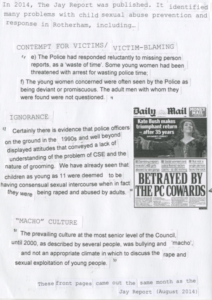
The point is not to deny that Asian men commit sexual violence – gendered sexual violence exists in all communities, and cultural context plays into how it manifests itself. The problem is that frames of ‘race’ and racialised ‘culture’ are always emphasised and overstated in media commentary and public discourse to the exclusion of others, such as misogyny, rape culture, vulnerability and austerity. When ‘Muslim ideology’ or ‘Pakistani culture’ are posited as the explanation for child sexual exploitation, this obscures the structural conditions that enable such abuse, whilst implying it is an issue of ‘their’ community, as distinct from ‘our’ (white) community. Perpetrators are often said to come from ‘closed’ or ‘segregated’ communities – framing them as those ‘bad immigrants’ who cannot or will not assimilate into (white) British society and respect imagined ‘British values’. The issue becomes one for which an essentialised and homogenised ‘Muslim community’ is held solely and collectively responsible, and subject to retaliatory attack.
As well as erasing white perpetrators, the ‘Asian model’ of grooming erases non-white and male victims of abuse, as if such cases are somehow less worthy of attention or less serious. We have seen how little public sympathy was elicited for Shamima Begum, a British Muslim who was targeted for online grooming by ISIS and left her East London home to join ISIS in Syria in 2015 when she was 15-years-old. Contextualising this in terms of a broader moral panic about the ‘Islamisation’ of the West, the popularity of the grooming gangs narrative is not borne simply of a concern for gendered sexual violence, but seems informed by anxieties about preserving the racial purity of the nation and tied to recycled tropes of white female victimhood at the hands of licentious ‘foreigners’.
(This is not to say white women are simply instrumentalised by the far Right. Exceptionalising Muslim sexual violence provides fertile ground for racist feminisms in which white women often collude. For instance, the white women-led German group 120 Decibel campaigns against sexual violence as a phenomenon ‘imported’ by migrants, positioning itself as part of the #MeToo movement.)
The racialised coverage of CSE and ‘political correctness’ narratives the media propagates encourage people to understand CSE primarily through the lens of race, as a distinctly ‘Muslim’ or ‘Asian’ problem – drawing on and feeding anti-Muslim tropes. Any attempt to centre other relevant structural and contextual factors then becomes ‘politically correct’ denialism, giving the green light to anti-Muslim sentiment whilst failing victims of abuse.
Local effects of media coverage
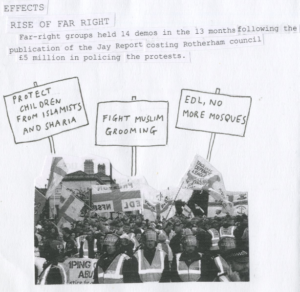
Politicians and commentators justify their focus on race by claiming that a refusal to talk about race in CSE cases only fuels the far Right. The fact is that the first large EDL mobilisation about ‘grooming gangs’ in Rotherham occurred on 13 October 2013, after years of sensationalised coverage, and less than a month after the Times ran a front-page feature making repeated mention of the Pakistani or ‘Asian’ heritage of perpetrators and the whiteness of victims in Rotherham. In the fifteen months following the Jay Report’s publication and the subsequent media storm, there were fourteen far-right demonstrations in Rotherham, the policing of which cost around £3 million. Far-right groups’ commitment to fighting sexual violence is somewhat doubtful when members shout things like ‘I hope your daughter gets raped’ to counter-demonstrators. But they are fairly successfully capitalising on the moral panic generated by the media, organising in affected towns to spread their anti-Muslim propaganda – sliding seamlessly from the issue of grooming gangs to ‘taking our country back’ and banning mosques.
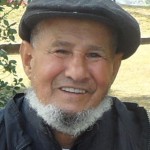
As the far Right has gained in public prominence, we have also seen an increase in anti-Muslim violence and harassment in areas affected by high profile ‘grooming scandals’. In Rotherham, there have been reports of verbal harassment and blame attributed to South Asian people, attacks on mosques and Muslim businesses, verbal and physical attacks on Afghan- and Pakistani-heritage taxi drivers, Muslim women spat at and abused, young Muslim and Sikh girls threatened with ‘revenge’ gang rapes by white men, and South Asian children being called ‘groomers’ by classmates. In 2015, an 81-year-old Yemeni man, Mushin Ahmed, was murdered in Rotherham on his way to early morning prayer by two white men who called him ‘groomer’, one of whom had recently racially abused an Asian taxi driver.
The state
Racialised discourses of threat – whether about mugging, knife-crime or grooming – legitimise an increase in state powers and interventions whilst simultaneously deflecting attention from the areas in which the state has actually failed in its social responsibilities. The rendering of Muslims as an inherent threat, prone to terror and sexual deviance, increases public willingness to collude in the erosion of civil liberties – through initiatives like Prevent and increased police and state surveillance powers – in the name of tackling crime and terror. These media scares can also serve to redraw the bounds of citizenship to increasingly exclude those ‘immigrants’ whose status here has always been precarious and contingent. In the Rochdale child abuse case, four of the (once) British-Pakistani offenders have been deprived of their British citizenship, and could face deportation after serving their sentences. Such cases normalise differential and increasingly higher standards for people of colour to have the right to remain in the UK. Just recently, the home secretary Sajid Javid attempted to justify the first deportation charter flight to Jamaica since the ‘Windrush scandal’ broke by referring to the criminal status of deportees. When concerns were raised with Sajid Javid that places like Pakistan do not have a sex offenders register, making it easier for offenders deported from the UK to repeat their crimes, he simply responded, ‘my job is to protect the British public’. Those deported or deprived of citizenship are then another country’s problem. [5]
Scapegoating ‘Muslims’ also lets the state off the hook for years of underfunding and privatising essential services. The one organisation singled out for praise in the Jay Report for its work identifying and supporting victims – the Risky Business project – was shut down (or ‘incorporated’) into a bigger team in 2011, amidst the ongoing CSE scandal. In the same year, the Labour-run council voted to close half of Rotherham’s youth centres. Between 2010 and 2016, Rotherham Council lost 33 per cent of its spending power in real terms, despite being faced with high demands for vulnerable children and family services, associated with significant levels of poverty and deprivation. Children in care are also disproportionately represented amongst CSE victims – in Rochdale, the majority of children’s care homes are privately run, with property values and cost cutting inevitably prioritised over the needs of vulnerable children. The broader structural issue of how austerity has failed victims is elided when commentary circles around the issue of race, or whether or not we should be talking about race.
Anti-racist feminism
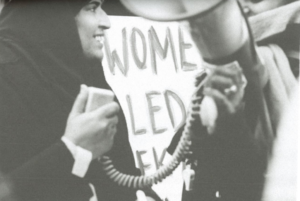
Just as a singular racialised focus on CSE fails to address issues of sexual violence, so too can simplified denouncements of such explanations. If we are to build real forms of anti-racist feminist solidarity today we have to strengthen our analyses. For example, rather than only pointing out that ‘white men rape too’, we need structural, contextualised analyses of all cases of sexual abuse. Whatever the ethnicity of perpetrators, we need to ask what were the structural conditions in that context that enabled sexual abuse, and understand what obstacles victims face in seeking help and support. Funding for youth services and accessible support spaces that do not stigmatise or criminalise victims would be a start. And if we are serious about dealing with issues of sexual violence within different communities, we must also fight for specialised support services that can address particular cultural and language needs of victims – many organisations on the frontlines providing this kind of support are having to fight for survival. Already many have been shut down.
The sticking point is how to address culturally specific forms of sexual violence without stigmatising entire communities. One way of dealing with this is to make the connections between apparently culturally-specific forms of gender-based violence – so-called honour-based violence, FGM, forced marriage – and issues of domestic violence more generally, focusing in on similar themes – for instance, control of women’s bodies. This would mitigate against the exceptionalisation of certain cultural manifestations of gender-based violence by connecting issues cross-culturally and forms a basis for meaningful feminist solidarity.
Another important strand in the argument is to recognise and emphasise that cultures are not monolithic or frozen in time – in any situation there will be many factors at play, including gender, class, sexuality, and diasporic context that inform practice. That way we can recognise specific cultural manifestations of gendered violence without blaming particular cultures as a whole.
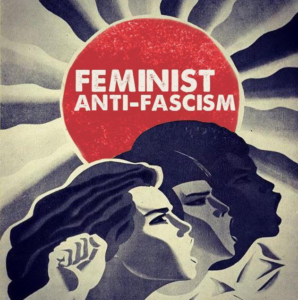
As there has been an escalation of far-right demonstrations in the UK this past year, the fight back has also significantly grown and changed. We’ve seen connections between anti-racism and anti-fascism grow stronger into a resistance movement that is fundamentally feminist. As the far Right changes and evolves, feeding off new moral panics around immigrants, and by extension, Muslims (and anyone perceived to be Muslim), our resistance must continue to broaden and expand.
This means rooting anti-fascism in our communities – bringing together people across society, including teachers, social workers, and doctors, and setting up community support services such as refuges for victims of domestic violence.
In October last year, the far Right was stopped on the street by a coalition of feminist and anti-fascist groups that created a feminist bloc at the front of the march. While street-based interventions are important, what is vital is this sort of coalition-building (including a range of grassroots groups such as queer migrant solidarity groups, sex worker activist groups and Asian mums’ networks), which builds on a history of fighting the far Right in the communities that are at the sharpest end of racist violence.
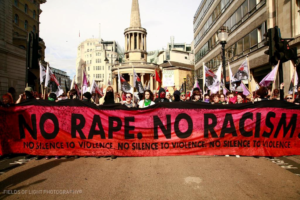

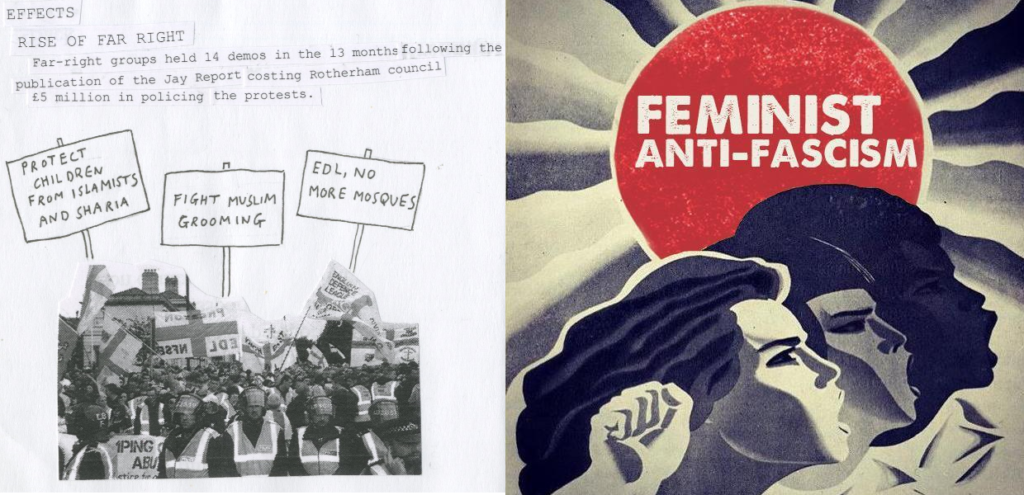
What an awful article. Where was the actual critical analysis? Rotherham was sensationalized in the media? May l remind you of the vast scale of these crimes?
You are an apologist, and not a very good one at that. Finally, are there any cases where the reverse has happened in terms of these crimes and ethnicity?
This article contains much sociology style jargon but it cannot get round the fact that there has been a sickening pattern in men from Pakistani Muslim backgrounds committing sexual offences against vulnerable, young white girls. Anyone who takes an interest in what is going in the crown court can see this happening .
What complete waffle, can you give links to majority white British rape gangs that groom young girls from the “ASIAN ‘ community, these crimes need to be highlighted, not explained away .
Shame on you Kay
This article is simply sickening. The author of this drivel should be ashamed to put their name to it. The main problem with this author is the belief in their superior intellect and the certainty that all right-minded people are wrong.
Four have commented, none have offered any evidence to contradict this article, but have by their evidence bereft confidence, shown themselves to have been wholly taken in by a dubious media narrative with added hysteria. They are “right-minded people”; but sadly, being right-minded is not the same as being right.
There have been a great many convictions for CSE since the start of the millennium. The notion that Asians are at the root of these is absurd given that currently, ethnic breakdown is incomplete and therefore not properly open for debate. The idea that how abuse manifests is susceptible to circumstances, cultural, social and environmental, is surely a sensible avenue to pursue; once the data is available. The bottom line is that gang grooming is not the only way child sexual exploitation happens and when one starts looking at differing patterns of abuse, entirely different influences and circumstances appear – along with many more victims.
It’s all too convenient to call foul on Pakistani Muslim communities whilst completely ignoring the fact that there have been thousands of abuse convictions over the same time span of these grooming gangs.
The whole sorry show needs to be aired and analysed properly to offer lessons in child protection and to prevent volatile people going off half cocked because they don’t understand data, evidence or proof.
Calling me far right because I was demonstrating is disgusting and typical left wing crap we have to put up with every day , my first cousins are Muslim , my best friends I’d a black man , never been arrested in my life never been to any far right demonstration like Britain first and BMP so you can stick that statement where the sun doesn’t shine !!
Interesting analysis on the subject. Thanks
Remember folks this is an industry. The race relations industry. These geezers are paid megabucks for coming up with this drivel. They couldnt give a damn for the dire, life-long consequences of this mass rape of working class white girls on the girls themselves, their poor families and communities. And remember there was a decades long cover up. When are those who knew what was going on but kept quiet, those in authority, going to face trial? Will it take as long as it did for the Hillsborough fsmilies?
You lost my interest when you started to argue the rather laboured point that white people commit CSE too, and appeal to the lowest denominator, the same tactics that tabloids use that you decry. Never mind that by all measures, these grooming gangs are record breaking in their number and scope… a few white British people are sexually interested in kids too! Hey ,look over there!
Let me just say that these “Asian” child abusers, are Muslim. We must say this because it’s important. Asian is misleading, they are not Chinese, they are Muslim. There’s a lot of analysis on paedophilia in the Koran, and the attitude of Mipuri Muslims to the so called sleazy nature of women in the west, I don’t need to repeat them here, you can Google it. You omitted any analysis of this because like the media you are afraid of being accused of racism.
Allow me to point a few definitive facts ,so far police have discovered around 34 different groups of child abusers .
There are different ethnicities involved but the largest number ,by far ,are asians most of whom are linked to Pakistan. The groups all began within a few months of each other .
The members are related in various ways be it family work or geographic.
If you take a look at proven facts the number of females who are sexually
assaulted and abused, which includes children in Pakistan is on the increase the problem being that data is not correctly recorded on a regular basis .
The are numerous items of evidence that prove that social services and police failed to act fearing being called racist by
That you would categorise Begum, somebody who traveled overseas on her own power for the express purpose of committing treason and providing support and comfort to those committing genocide and sexual slavery of Yazidi and other indigenous minorities, with vulnerable British girls who were gang raped, prosituted, and victims of similar crimes as Ms Begum’s copatriots committed has speaks to the extremely disturbing anti-British racism that I fear motivates you.
The comment function on this article is now closed.
The Institute of Race Relations